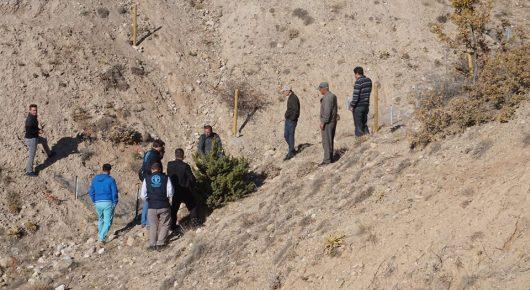Turkey promoting low-carbon technologies in Konya Closed Basin

Forests, pastures and agricultural landscapes are the focus of a new project in Turkey’s Konya Closed Basin, designed to introduce sustainable land management, climate-friendly agriculture, and conservation of the area’s biodiversity.
The project – financed by the Global Environment Facility, or GEF – aims for widespread adoption of low-carbon technologies. Both land users and policy makers will get involved, ensuring impact on the ground and at institutional and legislative levels.
The four-year, US$ 28 million project is funded mainly by GEF. It is co-financed and jointly implemented by FAO, Turkey’s Ministry of Forestry and Water Affairs and Ministry of Food, Agriculture and Livestock, Nature Conservation Center, an NGO, and Konya Seker, a private company operating in sugar beet production in the region.
The project focuses on three main components: rehabilitation of degraded forests and pastures, scaling up climate-smart agricultural practices, and creating a legal, policy and institutional environment that encourages sustainable land management.
The Konya Closed Basin, where project activities are planned, is located at the heart of Central Anatolia. The area is also known for its forests, biodiversity, and unique steppe landscapes hosting numerous endangered plant and animal species.
Despite its importance for Turkey’s natural heritage, the region faces numerous challenges: intensive agriculture, heavy grazing, and a lack of monitoring systems to enable informed decisions. The project will develop a monitoring and assessment system for conservation of important flora and fauna – such as endemic plants, butterflies, freshwater fish, and birds like the great bustard – a globally threatened bird species that breeds in one of the project’s pilot sites.
Overgrazing and soil erosion are among the causes of forest degradation in the area. As the soil’s fertile cover is eroded, carbon is lost from the soil. The project aims at reforesting degraded lands, taking steps to limit grazing in forests, and introducing wind-breaks, water-harvesting techniques and drought-resistant native species to reduce soil erosion.
Conservation Agriculture practices will be another major element of the project, to help reverse negative trends in the region’s degraded agricultural lands. Farmers will learn water-saving and crop rotation techniques, zero tillage, use of animal manure, and crop residue management to maintain the vegetative surface of soils.
The agriculture sector is one of the major contributors to greenhouse gas emissions worldwide. With this in mind, the project will introduce innovative methane capture technologies – establishing full-fledged “digesters” that can capture methane emission from agricultural wastes.
1 February 2017, Ankara, Turkey
